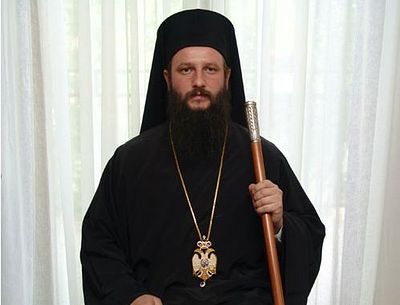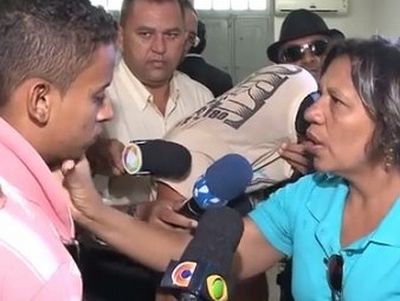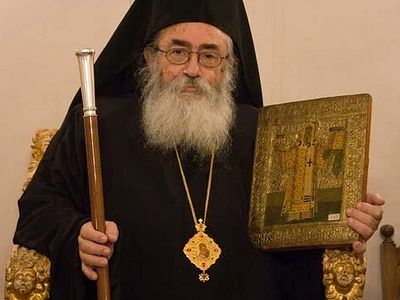 “God will help, you just have to believe,” “God is with us,” “Lord forgive me.” A drawing from juvenile prison No. 5.
“God will help, you just have to believe,” “God is with us,” “Lord forgive me.” A drawing from juvenile prison No. 5.
Tatiana Boriskina, a parishioner of the Church of the Apostles Peter and Paul in Moscow, is an amazing person. Having experienced clinical death at age forty, she came to believe in God and began going to church. From that time on, her entire life has been bound up with service to people. Despite serious health problems, she finds the strength to teach Sunday school, correspond with prisoners, give long distance lessons on the New Testament, and, what is most difficult, conduct study sessions on the fundamentals of Orthodox culture in juvenile detention center No 5, where underage offenders are detained for investigation of crimes. Not long ago Tatiana Pavlovna graduated from the St. Tikhon Orthodox Humanitarian University and defended her work on the theme of “Neo-paganism in the penitentiary institutions of the Russian Federation,” and “Apostatizing from the Orthodox Church is spiritual death (from examples of discussions with juvenile criminals in Investigative Isolation prison No. 5).” Tatiana Pavlovna talks about the joys and complications of her service and her not-so-simple pupils.
“My first university degree was in elementary school education, then I received my language education in English and Spanish, and later I graduated from St. Tikhon’s. I taught classes on Old and New Testament in Sunday school at the Church of the Life Creating Trinity in the Konkova [district of Moscow],” Tatiana Pavlovna says about herself.
Our talk began with a conversation on indifference, which is characteristic of modern man. After all, we have everything we need, and all is well with us. So we begin to think about whether we should go to church on Sunday—some have aches and pains, and are generally tired after the workweek. In prison it is entirely different. Prisoners have realized much, and it has all gone through the heart. If they have faith it is earnest. They go to confession, and are eager to go to church.
—There were many leaders of radical teenage gangs—they are the ones who would eventually attend every class. They could not understand what was happening to them; I had to call them for individual discussions, to explain, and there were often disputes in the groups on this subject. Later many were baptized and escaped from their former demonic state. You can’t call it by any other name—after all, satan was appearing to some of them on a daily basis.
There are various kinds of teenage gangs. There are pagan-nationalist bands, former skinheads. They are clearly distinguishable in the groups. There are fans—soccer fanatics, who are divided between the left, central, and fans. There are those who simply need to do something bad, like stabbing someone. They could care less whether the “messiah” Hitler is coming or not. And it is not a racial problem for them. They can even slash one of their own, and break into his car. There is no express ideology—each member expresses it in his own way. Someone introduces something new and they make it their own. Something else comes along and they insert that also into their ideology. So that ideology rises like a lump of dough, and the result is an unintelligible mixture of Kafka, Nietzsche, and the like. Only it is simplified to the level of the participants. It is just hooliganism without an ideology.
There are satanists—these are most often worshippers of rock groups or computers. The latter even sometimes have a tattoo with a special emblem: satan, and a computer. They are his servants. They live in a virtual reality. They sign contracts with him. They tell about how he comes to them and says, “Sign! Bow down to me and everything will be alright for you!” This often happens during a light sleep. And they agree, and sign. And although it’s not signed by hand it is already an agreement. Many boys truly have demons appearing to them. Then they come to the classes with the words, “I now believe in God! I saw the goat-legged one walking on the windowsill and nearly wet my pants with fear. Give me some books!”
But it also happens like this: “I won’t come to your classes. I’m scared. I had a bad dream last night. Satan came and said, ‘Don’t go to that lady!’ and I believed him.” Some were later afraid to come to the fundamentals of Orthodox culture classes.
But there are some stubborn ones among them, who say, “I’m going to go to spite him!” I say, “Are you ready to have him come again? Read the Creed or ‘Theotokos and Virgin Rejoice,’ or you can simply say, ‘Lord have mercy!’ if you can’t remember anything else, cross yourself without fail. But come to the classes.”
—Tatiana Pavlovna, how do you conduct the classes? It is hard to imagine that such pupils as yours would be able to sit through lessons in the ordinary sense of the word.
—Everything in prison happens spontaneously. I usually do not have a specific lesson plan. I don’t know who will be there. I pray before each lesson: “Merciful Lord, bless me to go to the prison, give me the group that You Yourself want. Grant me the grace of the Holy Spirit, as to the apostles. Say through my lips what You would like to say to these boys.”
Of course, it doesn’t work to teach the fundamentals of Orthodox Culture here in the accepted way. This is not a school—it’s different institution. Everything begins as question and answer. Then they get interested in something and we begin to discuss specific themes. Let’s say, the creation of the world. Sometimes this takes one day, other times it requires several lessons.
Some subjects particularly interest them. They ask, “Why did the devil become the devil?” They don’t understand why he, a creature made by God, fell away from Him. Further: “Who is the Archangel Michael? And how did this all happen?” I tell them. Then the conversation turns to man. We begin to talk about how in his fallen state, man’s spirit is subject to his body, that he is a bodily person, a slave to his passions and fleshly desires. I try to get them to enter actively into the discussion. That is approximately how the lessons look.
When a new group comes, a light has to be shined through it like an x-ray. Tattoos are very telling. Not all came consciously to the classes. There are those who come only to get out of their prison cells for a bit. “Why just sit here? Let’s go listen.” There are those who are interested: “We just wanted to listen.” I always give them the right to choose whether to remain at the lesson or return to their cells. They usually stay, and many later start coming out of interest.
It happens that an aggressive type might come to the class—a leader, and I can spot him. He will disrupt the lesson and take all the rest with him. And I address myself directly to him. He is a leader, and he’s the one you have to start with. I ask, “Perhaps you have an interesting question? You have intelligent eyes, and I can see that you are interested in everything.” A dialogue ensues. I can feel that it worked, that we are off to a start. After all, the entire group is looking to him—he’s gotten interested and they do also; he asks questions and the entire group gets into the conversation after him. At the end I say, “Whoever wants to come the next time, raise your hands. Or I will take a different cell.” “Don’t take a different cell! We’ll come!” I hear in reply.
I also teach long-distance classes from St. Tikhon’s on the New Testament for prisoners. Eighty people have finished this course, and forty are studying using the Four Gospels by Archbishop Averky (Taushev).
—But there are Moslems in the prison as well as Orthodox Christians. Do they also go to the classes?
—Sometimes Moslems also come. They listen, but they don’t take anything from my hands. I ask them, “Tell me, are you a Moslem?” “Yes!” “Do you perform the namaz?” “No.” “Do you read the Koran?” All my questions are answered in the negative. “Then what kind of Moslem are you if you don’t know your own religion?” Then I tell them about the Prophet Isa, and Who He is in Christianity. (I recently graduated from the St. Tikhon’s University specializing in comparative religions.) Some leave immediately, others come back, but never take anything (books or icons) from my hands. Only candy and sweets. They take these, of course. I always take something sweet to the prison. After all, they are children.
—Perhaps more correctional workers are needed in the prison?
—The worst thing is that the correctional workers don’t know anything themselves. They are foreign, often very far from educational work. They are not required to have a pedagogical education. They are the same kind of correctional workers that you’ll find in adult penitentiaries. In order to help the teenagers at least somehow assimilate the material I would bring a video recorder. We would have the lessons, and then watch a film on the corresponding theme. For example, if we spoke on the theme, “modern miracles,” and then I show them a film to support it, so that the boys would really see all these miracles coming from Orthodox icons. After all, this is better; they will assimilate more. Then I came to the classroom and the video recorder is broken, and everything is removed. Where were the correctional workers? I asked that it be left in the balance, and then there would have been a greater chance of saving the video recorder.
—Do you use any other forms of preaching?
—While there was a video recorder I showed films. At one time I and another missionary, Gennady Leonidovich Kolin, tried to conduct radio programs. Each prison has its own local radio, which transmits songs and music. At first it was very difficult. The boys greeted the idea with a “hurray!” but the administration didn’t like it. Yes, that also happens. The assistant director for educational work (he’s long gone) said to me, “Tatiana Pavlovna, why do you keep coming and coming? Don’t you have anything better to do?” They would keep me waiting for forty-five minutes before letting me into the cell, thinking that maybe I would leave. What was there to do? I would wait.
—Tell us about some incidents from your practice. When I worked in the Synodal department for prison ministry, we heard a story about a good Orthodox boy who made some stupid terrorist act and ended up in prison.
—That’s Grisha. A wonder! I haven’t seen such boys for a long time. It is amazing that he is there. Grisha wanted to study at St. Tikhon’s; he wrote poetry, and went to every class. Then I receive a note from him: “What a pity that I didn’t see you. They are sending me somewhere else.” Then his mother found me, called me, and told me about him. Grisha was an Orthodox boy, and he served in the altar. He wrote such poems, made such remarkable drawings!
He met some guys on the internet. They began to contact each other. They wrote to him about the year 1937 [a time if mass arrests and executions under Stalin], about how so many people were killed, shot by the NKVD. Teenagers can easily fall under someone’s influence. They organized a terrorist act. In fact it more resembled some sort of demonstration rather that a terrorist act. They detonated something at the entrance of that organization. No one was hurt, and practically nothing was destroyed. But the result for Grisha was eight years in prison…
There is another story.
A former fan, the leader of a teenage band with the nickname “Polar Bear”. Now he works as a plumber and is studying to be a teacher. He injured ten people in varying degrees of seriousness (as the say, he “slashed” them). He got eight years, and served four. He corrected himself, and now goes to church every Sunday.
I came to the prison, and one correction worker came to me and said, “A difficult boy has come to us. Maybe you’ll take him?”
I nodded. The boy comes in and says, “We are pagans, we don’t do anything wrong. We worship the Sun goddess. She is very pretty, with a long braid, and she comes to me everyday. She says that all non-pagans must be destroyed. “They are bad people, they don’t worship me. But you can see how beautiful I am. I find sponsors for sick people.”
I emptied trash containers at the cemetery. I don’t do anything wrong. We get together and perform ritual acts. Well, that we nearly killed a man—we were making a sacrifice to the Sun goddess Kali.”
I could see that he was not yet ready to talk. Okay, I thought, we’ll talk later.
I learned later that he wanted very badly to come to the classes. He came a second time, and told me, “I fell off the second level of bunks to the floor. She isn’t pretty at all.”
That was a demon that came to you,” I explained. “And Kali is a goddess that is mentioned in the Old Testament. People would throw their children to her, into the fire.”
“Now I am afraid like a dog about to be killed,” he said. Then he told me about his family. His name is Saad. His grandmother is a sorceress and his mother dabbles in black magic. His father lives in Arabia.
“That’s why I there’s no way I can become Orthodox.”
“If you’re a Moslem, do you read the Koran?”
“I know Arabic, but I don’t read the Koran.”
He was a fairly educated young man; he was in his second year of study at the University of the Friendship of Nations [a school for foreigners in Moscow]. And now he was afraid—the hand of God was leading him away from his former life. Then came the culmination. One day Polar Bear met Saad. As it turns out, they were acquainted. All the gangs know each other. Polar Bear asked, “Can I sit with Saad?” “Go ahead,” I answered.
Polar Bear was already baptized and catechized. Suddenly Saad said, “There he is, he’s come.”
I took some holy water and sprinkled the room: “In the name of the Father, the Son, and the Holy Spirit…”
“Tatiana Pavlovna, he’s leaving! He’s offended.”
“Do you see? They run from holy water.”
Here Polar Bear took over. “Are you baptized? Get baptized—you’ll feel better. I got baptized and I feel better. The devils that used to come to me!
Suddenly Saad jumped up and shouted, “I want to confess!” Apparently he was terrified.
But there was no priest near by. Then I told Polar Bear to stand by the door and not let anyone in. Saad fell to his knees before the icon, and said, “Lord Jesus Christ, I’m guilty before You! I betrayed You! I’m sorry,” although he wasn’t baptized.
I immediately called the head priest at the prison, Fr. John Churakov, and told him that one of the prisoners wants to receive holy Baptism.
And Saad was baptized. True, not at the first attempt. Fr. John sent a priest but they wouldn’t take Saad out to him. The second time was the same. Then, the third time, father came ill with a fever, the baptismal font was ready, and they told me that Saad was being taken to the Serbsky psychiatric institute for tests. There was no time. We started praying and—a miracle!—they lead out Saad and said, “You have twenty minutes. Baptize him.” Well, father and I made haste. We did it. We had only just finished when they came to get him.
Later he came to see me again, and said, “Now my whole family is baptized. They were baptized after I was.”










